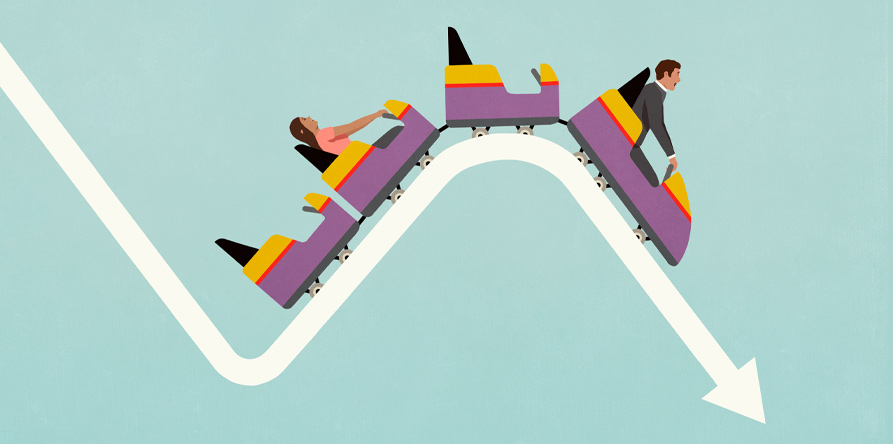
Thriving in economic uncertainty
Whether you’re new to investing or have been building your investment portfolio for years, you may be concerned about the possibility of a future recession. What causes them? How often do they happen? And how do they really affect you as an investor? Being armed with information can help you make smart and informed decisions when the next recession arrives.
Recessions happen when consumers and businesses curb spending, causing a country’s gross domestic product to turn negative for at least two consecutive quarters. But while the dreaded R-word can sound scary, recessions don’t happen as often as people may think, nor are they as devastating as the headlines often predict.
Despite many headlines predicting the next economic downturn, Canada has only experienced five recessions since 1970, and 12 since 1929, each only lasting between three to nine months. While markets often fall around a recession, they also tend to bounce back over time. The most recent recession, brought on by COVID-19 in early 2020, was considered both the shortest and deepest since the Great Depression that began in 1929. Understandably, recessions leave a lasting impression on investors and change their investing behaviour.
Understanding how recessions work and their potential impact on portfolios can help provide some perspective and important context that will, hopefully, result in smarter investing.
What causes a recession?
Not all recessions look the same: they come about differently and last for varying lengths of time. Here are a few factors that can contribute to a recession:
An economic shock: This is what happened with the COVID-19 recession. Government-mandated business closures led to a dramatic economic slowdown worldwide. Other sudden shocks can include wars, natural disasters and even terrorist attacks, which can cause supply chain interruptions that affect the flow of goods.
Rising inflation and interest rates: When inflation gets too high, central banks try to control it by increasing interest rates to slow down spending and borrowing. If rates rise too quickly, and if inflation gets out of control, consumers could stop spending and trigger an economic slowdown. Central banks always try to balance inflation and interest rates to avoid tipping the economy into a recession.
Lack of consumer and business confidence: Consumers and businesses are key drivers of economic growth. When consumers get nervous about losing their jobs, affording groceries and paying their rent or mortgage, they tend to curb their spending. It’s the same for businesses: companies worried about the economy will pull back on spending and investment.
In all these situations we typically see warnings signs in the lead-up to a downturn, including significant layoffs, a pullback in business investment and some companies defaulting on their loans. That can then trigger a major slowdown in consumer spending, housing market volatility, increased personal bankruptcies and more, all of which can lead to a recession.
How does a recession affect the market?
There are several ways a recession can affect stocks and bonds.
Stock prices drop: The price of various securities, such as stocks, mutual funds and exchange-traded funds, tend to fall, but they most often fall in the lead-up to an official recession. That’s because markets are considered forward-looking: if investors see weakening economic data, they might move money into cash, knowing that at some point, that data will result in lower company earnings.
Increased market volatility: Investors understandably tend to be more cautious and risk-averse in a recession. While the phrase “buy low and sell high” sounds good in theory, it can be hard to do in practice, with some investors doing the opposite. Investors may also be more sensitive to economic data and corporate earnings during a recession, buying on good news and selling on bad. All this nervous behaviour can lead to increased market volatility.
Lower interest rates: During a recession, central banks are likely to lower rates to stimulate economic activity. Lower rates tend to have a positive impact on stocks, because if commercial and consumer borrowing costs decrease, then spending can increase, which leads to better earnings. However, lower rates can cause problems for those who are buying new bonds, because they won’t get as much yield on their fixed income investments.
How to navigate the market during a recession
For investors with a long time horizon, the best course of action is continue investing on a regular schedule, regardless of the economic environment. For many investors, a recession provides an opportunity to buy stocks at cheaper prices. While its tempting to try to sell and wait for better market conditions, history shows that timing the market is extremely difficult.
One of the best ways to protect your portfolio is to diversify your investments so they include a mix of stocks, bonds and alternative assets. Diversification across sectors and geographies is also a good idea. More recently, some are turning to cryptocurrencies as an alternative asset class that can – at times, but not always – rise when stocks decline.
Investors worried about a recession should also review their risk tolerance. A more cautious person might invest in more defensive sectors in a market downturn, such as utilities, health care and consumer staples. These sectors are sometimes called “recession proof” because they provide essential goods and services, such as electricity, medicine and groceries, that people will need regardless of the larger economic environment. Of course, there are no guarantees that companies in these sectors will outperform, or even avoid losing money, in a recession.
Investors seeking to make changes to their portfolio should speak to a financial advisor first to ensure the decision aligns with their individual financial situation, risk tolerance and investment goals. An advisor can also help investors avoid making decisions based on emotion, such as panic selling when markets are down.
It’s important to remember that recessions are a natural part of the business cycle: markets go up and they go down. Also know that over time, markets tend to rise, and stocks have made significant gains over the years. If you panic and sell, you could miss out on the upswing, which can be strong and sustained. The best thing to do? Stay the course and focus on your long-term financial goals.

